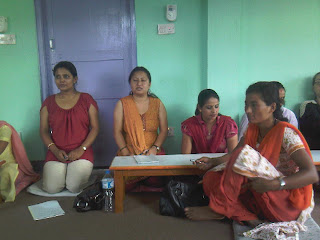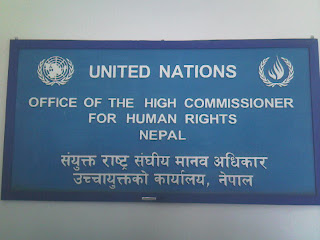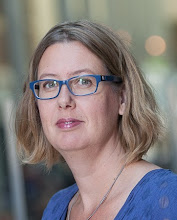It was hot and exhausting, our field trip.
But it was also very interesting.
We left at 7, in a decorated bus, because Marije had her birthday.
It took us more than 4 hours to drive from Godavari through Kathmandu to Dading, a town (and district) North-West of Kathmandu. When we arrived, we were welcomed by a group of about 20 Nepali women who belonged to the Women’s Rights Defenders Network in Dading (the district). Board members, volunteers and survivors: victims of domestic violence who had taken the difficult decision to come forward and report the violence.

The women told us about their difficult work in a rural area of Nepal, with is strong patriarch traditions of arranged marriages, dowry and total dependency of women (first to their own family, after marriage to their in-laws). But even within a few years they achieved things. Before the police was very reluctant to take any case of domestic violence seriously. Most victims were send home. After a while, cases in which victims were supported by the WRHD-Network were taken up, and nowadays the polices sometimes even calls the Network to support a victim that has come to the police by herself.
But there is a long way to go. And the women who work in the Network are not safe. We were told the story of Laxmi Bohara, who was murdered on 7 June 2008 by her husband and mother in law who objected the human rights work that she was engaged in fighting for women's rights. ut we were also told how how women’s groups had fought to and eventually succeeded in getting the killer sentenced. (more information).
Also the survivors told their heart breaking stories. About being locked up in a house where the water came in. About being send back to your abusing husband by your own family which refused to ‘have you back’. But also about empowering by education, and the solidarity of other women. And I hope that our visit to them was helpful for that as well. To show them our solidarity, to make their stories listened to. To give them a small amount as financial support. I wished we could do more to support them. Not to take things over that is: they are strong women, and very well capable of organising themselves, set their own agenda and empower themselves and the Nepali women.
After a lunch in Dang we went back by bus. It was still very hot, and the trip took us again hours (although only 2 ½ ).

At five we arrived at the office of the UN Commissioner on Human Rights in Nepal, where we spoke with two representatives. They informed u about the situation of women in Nepal, and the various forms of Violence Against Women which are prevalent in the country. The UNCHR is working quite hard on the issue, with conferences, discussions with government, cooperation with NGOs and training of state officials and police officers in various districts of Nepal. They were also interested in the tool we are developing.
Both visits together provided a rather good (although far from complete) picture of domestic violence in the country. Afterwards, we were all very tired, and very impressed.


Een indrukwekkend relaas, goed werk!
BeantwoordenVerwijderenMai Neijens